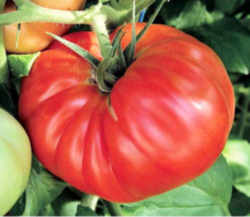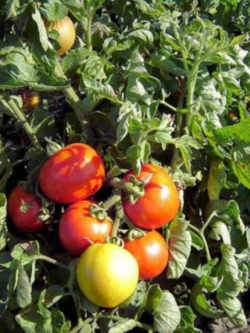
Tennessee Symbols
Tennessee State Fruit
Tomato

(Lycopersicon lycopersicum)
Adopted in 2003
Waving red fans shaped like a tomato and emblazoned with the words ''Tomato Fan,'' the members of the state House passed and sent to the Senate the legislation proclaiming the tomato Tennessee's official state fruit.
The tomato, (Lycopersicon lycopersicum,) was designated as Tennessee's official state fruit by Chapter 154 of the Public Acts of 2003.
There was the expected horseplay while sponsoring Rep. Dennis Roach, R-Rutledge, tried to be serious by telling his colleagues that tomatoes are
Tennessee's No. 1 fruit crop.
Rep. Rob Briley, D-Nashville, read from a list of tomato a varieties and asked Roach if each variety was the state fruit. Roach assured him that was
the case.
Tennessee State Fruit : Tomato

Lycopersicon is the botanical name for the Tomato plant. The fruits of these plants are international favorites and there are more varieties sold of it than of any other vegetable. They may be eaten cooked or raw and are a good source of vitamins. The Tomato loves sunshine and is grown as a warm-weather annual, although it is actually a tender perennial. It is grown in greenhouses where summers are too cool for pollination and fruit to set in gardens. The garden varieties of Tomato come from two wild types; L. esculentum and L. pimpinellifolium are originally from western South America. The Tomato was introduced into European gardens in the early part of the sixteenth century, though it wasn't accepted as being edible; this may be possibly because it belongs to the Nightshade family (such as the White Potato, Eggplant, Pepper and other members of the Potato family, Solanaceae) and resembles many plants that were known to be poisonous; it was grown as an interesting ornamental plant. Tomatoes were grown in 1781 by Thomas Jefferson in Virginia, but weren't really known in America as an edible food until after 1834 and it was some years later that they even became popular.
Tomatoes are grown on a wide range of soil types in Tennessee, from rich, silty loams in the western part of the state to silty river bottoms of the eastern region. Standard production practices include use of methyl bromide fumigation, raised beds, black polyethylene plastic-culture mulch, and drip-irrigation. Rows are usually spaced 4 to 6 feet apart, and plants are spaced at 18 inches within the row. Most growers produce their own transplants in greenhouses. Some transplants are purchased from Florida. Tomatoes are staked, pruned, and tied using the Florida string-weave system. All varieties are determinate, slicing-type tomatoes, and with the exception of a few cherry types. Full-season production takes place in western Tennessee, with planting beginning in mid-April. The production season is later in eastern and central counties, with mid-May to mid-June plantings. Late season production is practiced in eastern and western Tennessee, with late-June plantings. Much of the production is for mature green tomatoes, although there is some vine-ripe production in all areas. It is difficult to plant early season in eastern Tennessee due to frost risks and all regions produce till fall frosts occur.
Tennessee Tomato History
The tomato a fruit or vegetable? They're a fruit by definition. The Webster School & Office Dictionary defines a tomato as "The pulpy, edible fruit of a plant." It's defined by The American Heritage Dictionary in this manner: "A fleshy, smooth-skinned reddish fruit, eaten as a vegetable."
In the late 1800's, the US Supreme Court decided tomatoes were a vegetable, this happened when the court had to decide whether tomatoes should be
taxed as a vegetable under the 1883 Tariff Act and ruled that they could, deciding: "Botanically speaking tomatoes are the fruit of the vine,
just as are cucumbers, squashes, beans and peas. But in the common language of the people, all these are vegetables, which are grown in kitchen gardens
and are usually served at dinner in, with or after the soup, fish or meats and not, like fruits generally, as dessert". So there you have it,
our great ancestors turned a fruit into a vegetable.
Over a century later, in the early 2000's, the Tennessee legislature declared tomatoes Tennessee's official state fruit. Fruit or vegetable? And so
the argument still remains. Hmmm, well I guess that it's really only a debatable subject if you live in the state of Tennessee. But in Tennessee, the
tomato's fruit or vegetable debate takes a distant second place to the daily debate on who has grown the better tomato.
Tennesseans are proud of their tomatoes and honor them each year during its growing season, which occurs each year from Mid-June till Mid-October.
Tennessee Law
The law designating the tomato as the official Tennessee state fruit is found in the Tennessee Code, Title 4, Chapter 1, Part 3, Section 4-1-327.
Title 4 State Government
Chapter 1 General Provisions
Part 3 - State Symbols
SECTION 4-1-327
4-1-327. State fruit. --
The delicious tomato, Lycopersicon lycopersicum, is designated as the official state fruit.
[Acts 2003, ch. 154, § 1.]
Taxonomic Hierarchy: Tomato
Kingdom: Plantae - Plants
Subkingdom: Tracheobionta - Vascular plants
Superdivision: Spermatophyta - Seed plants
Division: Magnoliophyta - Flowering plants
Class: Magnoliopsida - Dicotyledons
Subclass: Asteridae
Order: Solanales
Family: Solanaceae - Potato family
Genus: Solanum L. - nightshade
Species; Solanum lycopersicum L. - garden tomato

List Official US State Foods






